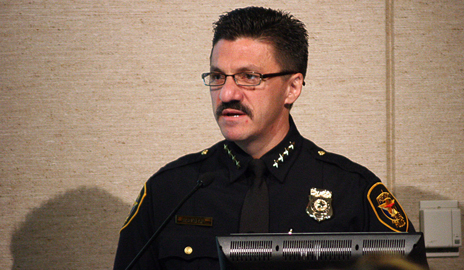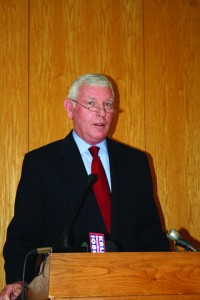LGBT leader praises Halstead’s initiative, says ties between city, LGBT community continue to strengthen
TAMMYE NASH | Senior Editor
nash@dallasvoice.com
FORT WORTH — Fort Worth Police Chief Jeffrey Halstead has implemented a new policy banning “bias-based policing” in his department, and Fort Worth LGBT community leader Jon Nelson this week praised the new policy as “a very positive move.”
“We didn’t discuss this with him [Halstead]. Nobody pressured him to do this. He did it on his own,” Nelson said of the new policy. “It’s as clear as it can be. It puts his employees on notice that they have to act without bias, and there are specific ramifications if they fail in that. I say, good for him.”
The policy, which Halstead issued Friday, Feb. 4, notes that “bias-based policing is prohibited in both enforcement of the law and delivery of police services.”
Any officer who violates the policy can be fired immediately.
The policy, the full text of which is available online at DallasVoice.com, reads: “Officers shall not use race, color, gender, age, national origin, religion, disability, economic status, sexual orientation, gender expression, gender identity, transgender status, membership in a cultural group or an individual’s ability/inability to speak English as the criteria for determining when or how to take enforcement action or provide police services.”
In an e-mail interview this week, Halstead said that although officers were already banned from acting on personal bias while on duty, the new policy is intended to reinforce that ban.
“The policy basically incorporates language located throughout departmental General Orders and consolidates it into one succinct order that clearly defines what bias-based policing means and strictly prohibits it,” Halstead said.
He also said the new policy was not implemented as a response to any particular incident, including the June, 2009, raid on the Rainbow Lounge gay bar by Fort Worth officers and agents with the Texas Alcoholic Beverage Commission.
Instead, Halstead said, “It is a proactive step to continue building trust in the community, which is essential for public and officer safety.”
Halstead said that the new policy has been in the works since last summer when he asked his chief of staff, Lt. Paul Henderson, to research the idea and see if any other major cities had similar policies before drafting the Fort Worth policy.
“Creating policy can take a significant amount of time,” Halstead said. “We have to be careful to ensure we are not in conflict with any laws or regulations. And once it was drafted, we circulated it to our community relations officers, police leaders in our diverse associations and our law department to provide input and feedback.”
Once the final draft was complete, the order went into effect on Feb. 4.
“Although no specific reason behind the timing exists, it is appropriate and holds special meaning that the order went into effect at the beginning of Black History Month,” Halstead said.
The chief said that any officer who witnesses a possible incidence of biased policing is required to report the incident to his or her supervisor. The supervisor then reports the incident to the department’s Internal Affairs Division, which will investigate the allegations.
Citizens should report such violations directly to Internal Affairs, the chief said.
“Internal Affairs investigates all allegations dealing with discrimination in the workplace, as well as the city’s Human Resources Department,” Halstead said. “Internal Affairs is the lead investigative entity for allegations of discrimination regarding employees as it pertains to interactions with the public. If it is found that any criminality exists on the part of a police employee, the chief’s Special Investigative Unit would take the lead for filing criminal charges if applicable.”
Halstead also noted that his department is “in the process of putting together a hate or bias crimes alert program” through which community members who subscribe to the program will be notified of any hate or bias crimes that are reported. He said that the department is “in the process of completing the computer program necessary to build the service.”
In 2010, Halstead said, “six actual hate crimes” were investigated by Major Case detectives, the officers tasked with handling such cases.
“We use the word ‘actual’ because the definition of a hate crime is very specific regarding the primary motive for a criminal act, and many times what is reported as a hate crime does not meet the statute’s criteria,” Halstead said.
“In the future, we are looking to begin tracking ‘bias’ incidents, meaning that if any actions or statements are made as a part of a crime, but the crime itself does not meet the criteria of a hate crime, we want to be able to track those as ‘bias incidents,’” he said.
Halstead added that the new ban on bias-based policing is not directly related to the hate crime alert program, but is instead “more related to the protection of individual rights of our communities and to provide a clear departmental position that bias-based policing will not be tolerated.”
Although many LGBT community leaders were angered with Halstead’s initial response to the Rainbow Lounge raid, most now consider the police chief a valuable friend to the community.
“He is a human being, just like anyone else. We all make mistakes,” Nelson said of Halstead. “But he has gone from ‘Let’s just take a deep breath’ to, on his own, coming up with this new policy, a policy that has real teeth. That is a long way to come.
“I think that every step he has taken has brought the police department and our community closer together, starting with [the appointment of openly lesbian Officer] Sara Straten [as the department’s liaison to the LGBT community],” Nelson said. “That’s not just window dressing. … I think the chief wants his police force to be fundamentally fair, and he’s willing to buck the Police Officers Association to do it.”
The Police Officers Association is the FWPD officers’ union, an organization, Nelson said, with “tremendous political clout” whose “only concern so far has been to protect their own, even officers convicted of DWI and killing people with cars.”
Some community leaders have also suggested that it was pressure from the Police Officers Association that kept Halstead from being able to hand down stiffer discipline to officers involved in the Rainbow Lounge raid.
Halstead said this week that while his leadership approach “has not necessarily changed, I continue to learn from mistakes and experience personal growth. True leadership demands constant evaluation and adjustment in order to provide the best service possible. … It also requires some risk-taking to implement progressive change within any organization.”
Halstead said that he believes “the culture of policing” is changing at the national level as the diversity of the country grows, and progressive police departments are “taking proactive steps to facilitate those changes as quickly as possible.”
“My intent when I was hired as the Fort Worth police chief has always been to focus on service and to provide an organizational model of ‘service with respect.’ That has not changed,” Halstead said. “I am proud that our police department is being viewed as a progressive policing model and remains on of the leaders in community policing today.”
Nelson said he believes that the strengthening relationship between Halstead’s department and the LGBT community is mirrored by the strengthening relationship between the community and city government over all.
“The bottom line is, we’ve gotten used to each other. There is a level of trust here now,” Nelson said. “They [city officials] understand that the community, that Fairness Fort Worth for example, will not be reluctant to stand behind the police chief when he does something like this. Nor will we be reticent to voice opposition if necessary.
“But we won’t do it by calling names or demonizing anybody,” he added. “We will do it the way the First Amendment meant for it to be done. We will voice our opinions, and we will take action when necessary.”
This article appeared in the Dallas Voice print edition Feb. 11, 2011.

















